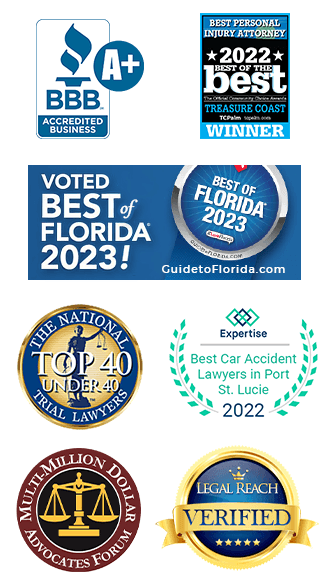

Port St. Lucie Nursing Home Abuse Lawyer
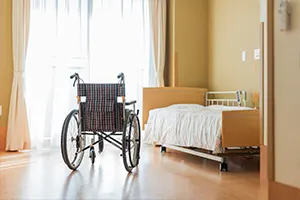 It’s an appalling fact that numerous seniors and disabled adults suffer some form of abuse at nursing homes. Florida alone has had many cases of nursing home neglect or abuse that led to injuries and deaths. Our nursing home abuse attorney in Port St. Lucie noted that official numbers do not even include so many unreported cases where the adults do not recognize they are being harmed or are unwilling to document it.
It’s an appalling fact that numerous seniors and disabled adults suffer some form of abuse at nursing homes. Florida alone has had many cases of nursing home neglect or abuse that led to injuries and deaths. Our nursing home abuse attorney in Port St. Lucie noted that official numbers do not even include so many unreported cases where the adults do not recognize they are being harmed or are unwilling to document it.
If you think that your loved one is being neglected, abused, or mistreated in a Florida facility, speak to Philip DeBerard, Injury Attorney. The DeBerard team is a highly reputed firm serving South Florida and the Treasure Coast, and we’re well-equipped to protect your family member’s rights and yours. We ensure the resident is safe as we craft the best strategies to hold the defendant accountable and win financial compensation for you.

Is There a Deadline for Filing a Nursing Home Abuse Lawsuit in Port St. Lucie?
Under Florida’s Statute of Limitations, you have only two years to sue for abuse or neglect at a nursing home, which starts on the last known date of abuse. Two years may seem like ample time to initiate a lawsuit, it’s vital to take action early by getting an attorney to preserve evidence.
Nursing Home Abuse Signs: How to Tell If Your Loved One is a Victim
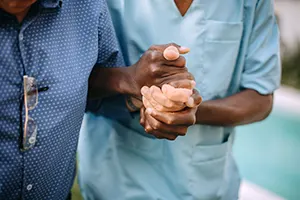 Could your family member be abused while staying at a facility? Take note of the following common red flags that may indicate the resident has been abused or neglected (We expound more on various forms of abuse further below):
Could your family member be abused while staying at a facility? Take note of the following common red flags that may indicate the resident has been abused or neglected (We expound more on various forms of abuse further below):
- Odd bruises, cuts, broken bones, burns, or marks on skin
- More than one falling instances
- Bed sores or avoidable infections
- Lack of proper hygiene
- Weight loss
- Lost interest in usual hobbies
- Irritability
- Sudden unexplained changes in properties.
When you notice these signs of nursing home abuse, it’s wise to contact an attorney immediately. Here at the DeBerard law firm, we first ascertain whether your loved one has to have immediate interventions, and if so, we’ll help ensure they get what they need. We’ll also advise you on your lawful remedies to demand answers from the staff or management, and to pursue the compensation your family deserves. Contact us today to schedule your free consultation.
How Do I Report Abuse in a Port St. Lucie Nursing Home?
 If your loved one needs urgent medical care or law enforcement, call 911 right away.
If your loved one needs urgent medical care or law enforcement, call 911 right away.
In Florida, the agency that regulates, inspects, and licenses nursing homes and assisted living facilities (ALFs) is the Agency for Health Care Administration (AHCA). If you wish to file a complaint involving a Port St. Lucie location, you may do so with AHCA by through their phone number 800-955-8771 or 1-888-419-3456, or through their online complaint form.
Florida also has a state-run volunteer service called the Long-Term Care Ombudsman Program, which investigates and resolves complaints about nursing homes. You may call them at 1-888-831-0404 (toll-free) or 1-850-414-2323.
While it’s useful to raise your concern to these agencies, they are not the legal means to get compensation for your medical fees, therapy costs, pain and suffering, and other losses. To seek compensation, you’ll need to initiate a civil claim against the wrongful party. Let us help you with this process. Our experienced Port St. Lucie nursing home abuse lawyers can be your advocate to help you gain back what you deserve.
Types of Elder Abuse
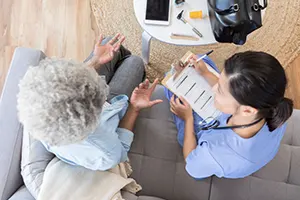 Abuse can be physical, emotional, sexual, or financial. Even neglect of the elder can be considered abuse as well. Take a look at how these types of abuse typically occur at a nursing home, and what symptoms to check for.
Abuse can be physical, emotional, sexual, or financial. Even neglect of the elder can be considered abuse as well. Take a look at how these types of abuse typically occur at a nursing home, and what symptoms to check for.
Physical Abuse
This can occur by slapping, striking, kicking, or punching a resident. Painful restraints may also fall under this category. Note signs such as:
- Unexplained bruises, welts, cuts, or scars
- Sprains or fractures
- Bedsores
- Injuries or body aches that don’t coincide with the staff’s explanation.
Emotional Abuse
A resident may develop trauma if they experience swearing, shouting, intimidation, or humiliation from personnel. Some unethical facilities may also place a resident in confinement or isolation as a form of punishment. Indicators of emotional abuse will be harder to spot. Be on the lookout for your loved one’s:
- Sudden changes in behavior
- Lack of interest in usual activities or hobbies
- Anxiety or agitation
- Withdrawn personality
- Depression.
Sexual Abuse
We may think of this as rape or sexual assault, but it also includes non-consensual intimate touching, sharing of sexual media, and forced nudity. Indicators of sexual abuse may include physical and emotional red flags such as:
- Unexplained bruises or scratches
- Genital sores
- Suddenly contracting sexually transmitted diseases
- Recoiling when being touched
- Becoming unsociable.
Financial Abuse
This type of abuse is when a caregiver exploits a vulnerable adult’s assets for personal gain. This often entails manipulation, intimidation, threats, or putting pressure on the resident. Here are some indicators of financial exploitation:
- Unexplainable withdrawals from the resident’s bank account
- Missing cash or possessions
- Resident suddenly signing over assets
- Unpaid bills
- Sudden modifications in the resident’s estate plan or will.
Nursing Home Neglect
Neglect means insufficient or improper care of the facility’s residents. Some common examples are insufficient mobility assistance for impaired residents, not administering medication as required, lack of cleaning or sanitation, lack of response to falling accidents, and not contacting a doctor when required. If your loved one has been neglected, they may manifest symptoms like:
- Bedsores (these skin lesions could be prevented if residents with mobility issues are repositioned by staff at specific times)
- Untreated infections
- Several falls that go unaddressed (when a resident falls, their care plan must be revised by the nursing home or ALF in order to lessen the chance of subsequent accidents)
- Weight loss, malnutrition, or dehydration
- Poor hygiene or unkempt living quarters
- Elopement (resident leaves the nursing home without supervision).
Some at Greater Risk of Suffering Nursing Home Abuse
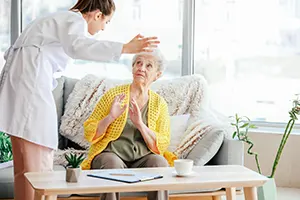 Lamentably, certain groups of people could be more at-risk of abuse precisely because they’re in a vulnerable state. One study revealed that older adults having Alzheimer’s, dementia,, or other cognitive impairment are at the greatest risk – their abuse rate is nearly five times that of similarly aged persons without dementia. This study also noted that those older than 80 face a higher risk of getting abused than younger individuals.
Lamentably, certain groups of people could be more at-risk of abuse precisely because they’re in a vulnerable state. One study revealed that older adults having Alzheimer’s, dementia,, or other cognitive impairment are at the greatest risk – their abuse rate is nearly five times that of similarly aged persons without dementia. This study also noted that those older than 80 face a higher risk of getting abused than younger individuals.
Further, there is much research highlighting the effect of social isolation in increasing abuse risk. Without the constant companionship of family around them, adults in nursing homes find very little support network which can ideally help recognize when abuse happens. During those occasions when family is around, abuse victims commonly feel too embarrassed, ashamed, or intimidated to open up about their experiences.
It’s vital for family members to be perceptive of the signs of nursing home abuse. Even if you are unsure about what’s happening, it’s smart to consult a knowledgeable attorney to help you identify your best next steps.
Parties That May Be Liable in Elder Abuse
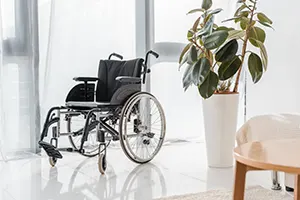 Various parties may be responsible for nursing home abuse. In many cases, more than one parties are held liable to pay for the death, injury, or other losses they caused. Below are persons or entities that may be answerable in elder abuse cases:
Various parties may be responsible for nursing home abuse. In many cases, more than one parties are held liable to pay for the death, injury, or other losses they caused. Below are persons or entities that may be answerable in elder abuse cases:
- The facility’s personnel or staff
- Nurse’s aides
- The owner of the nursing home company
- The administrator of the facility
- The licensee of the specific branch
- A supplier or contractor of the nursing home
- Negligent doctors or other healthcare providers.
When you’re making a claim against well-resourced defendants, it can be extremely difficult to fight for your rights. You can expect to face major insurance companies and even defense lawyers shielding the culpable party. Get the help of a trusted nursing home abuse attorney in St. Lucie County with proven experience handling such claims. In South Florida, Philip DeBerard, Injury Attorney is among the most trusted firms, and we are here for you.
Contact Philip DeBerard, Nursing Home Abuse Attorney in St. Lucie County
Chosen as the Treasure Coast’s top personal injury attorney by TCPalm, Philip DeBerard, Injury Attorney has a long history as an effective fighter for South Floridians. The DeBerard office has been helping residents of Port St. Lucie for over 40 years, recovering millions of dollars for persons who suffered because of the fault of others. Talk to us about your potential nursing home abuse claim. Schedule a free consultation by dialing 1-800-299-8878 today.
Injured?
Request A Free Case Evaluation




